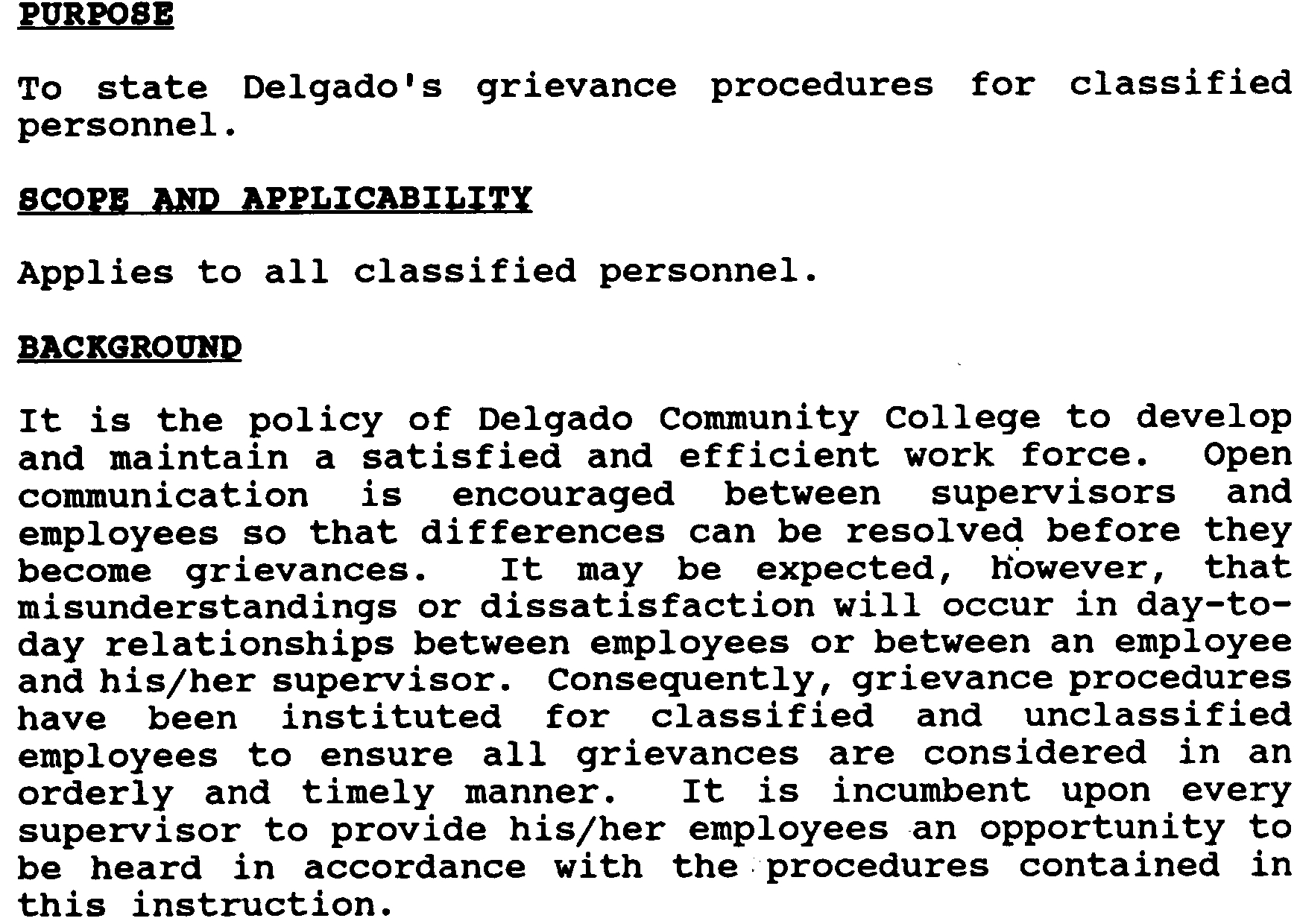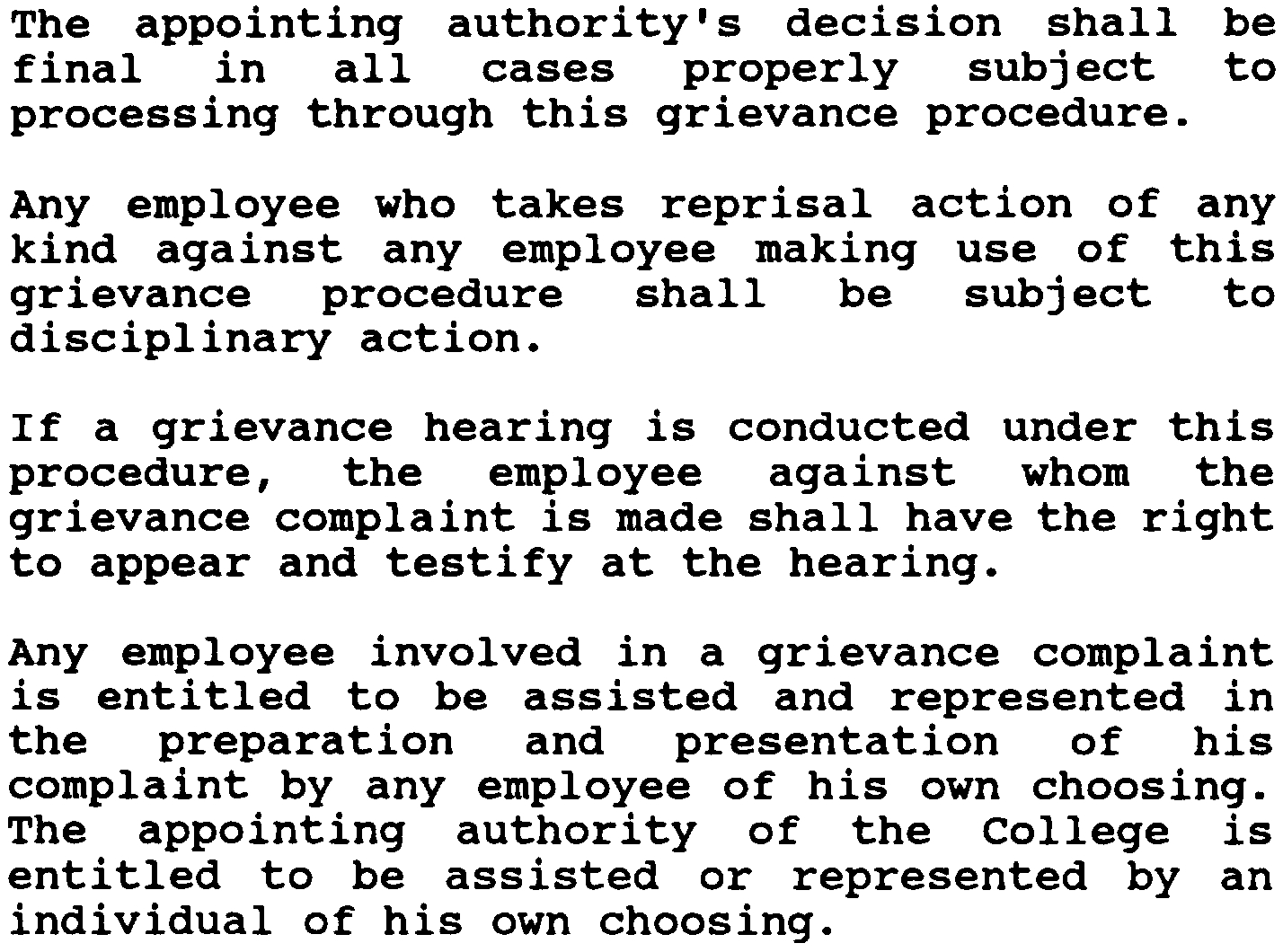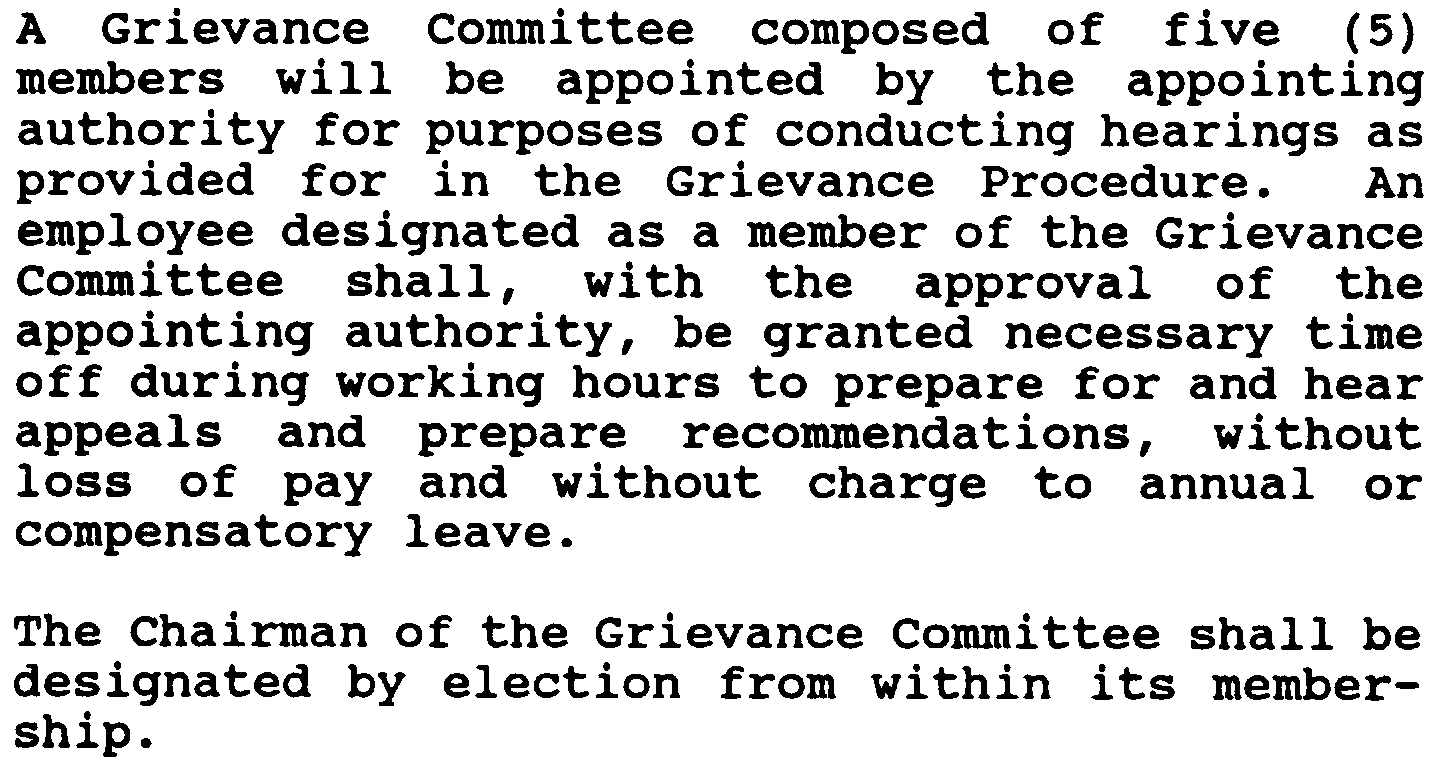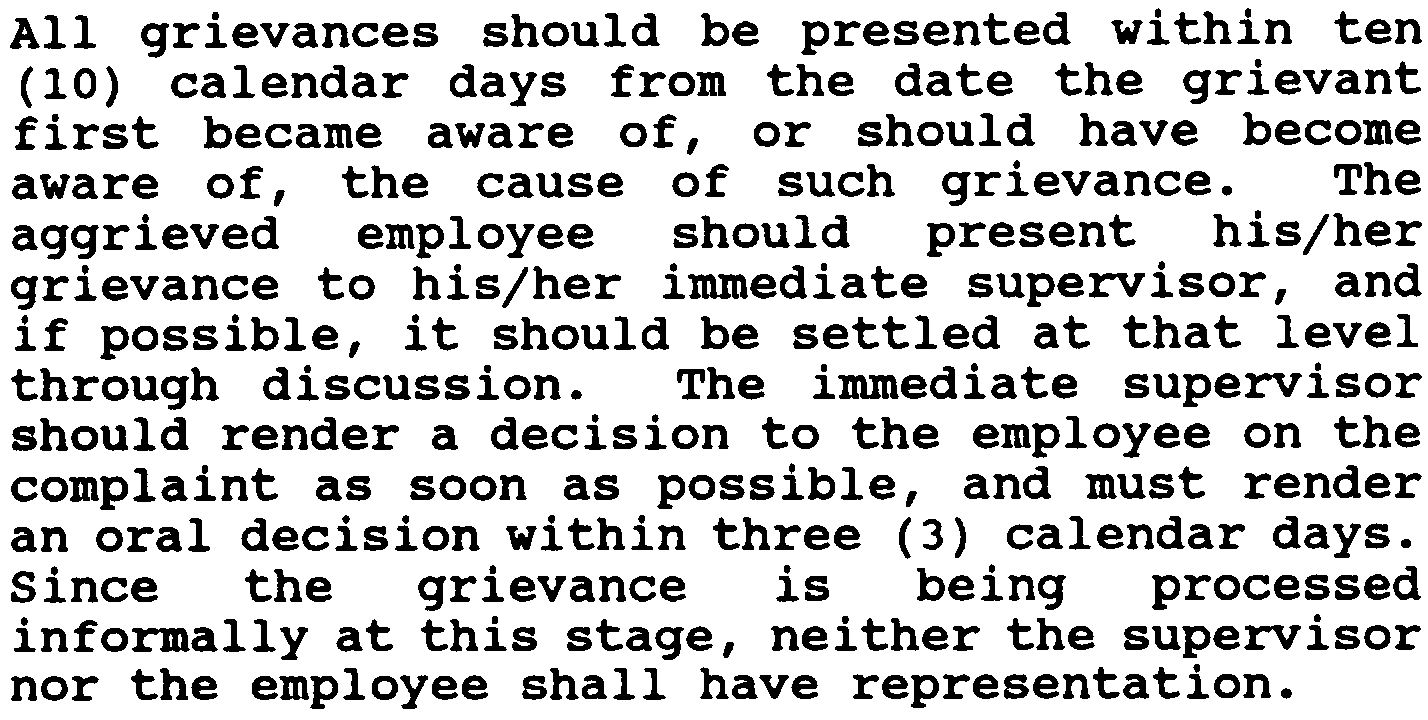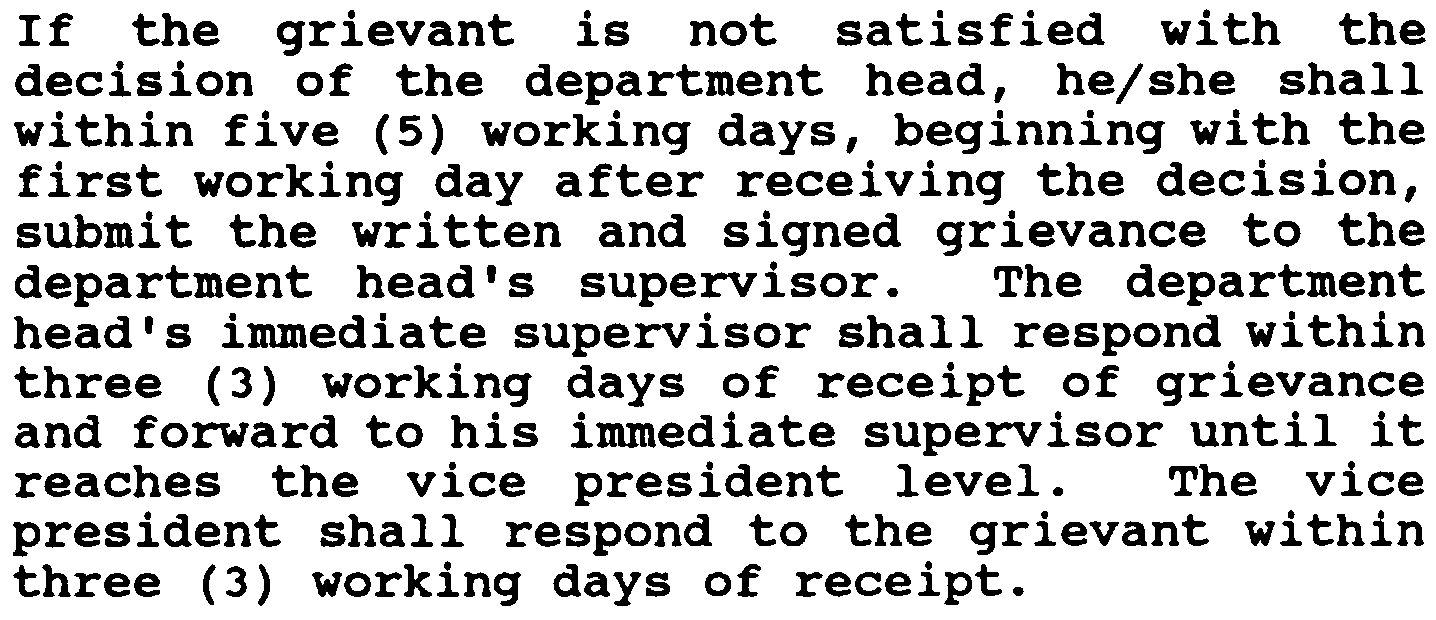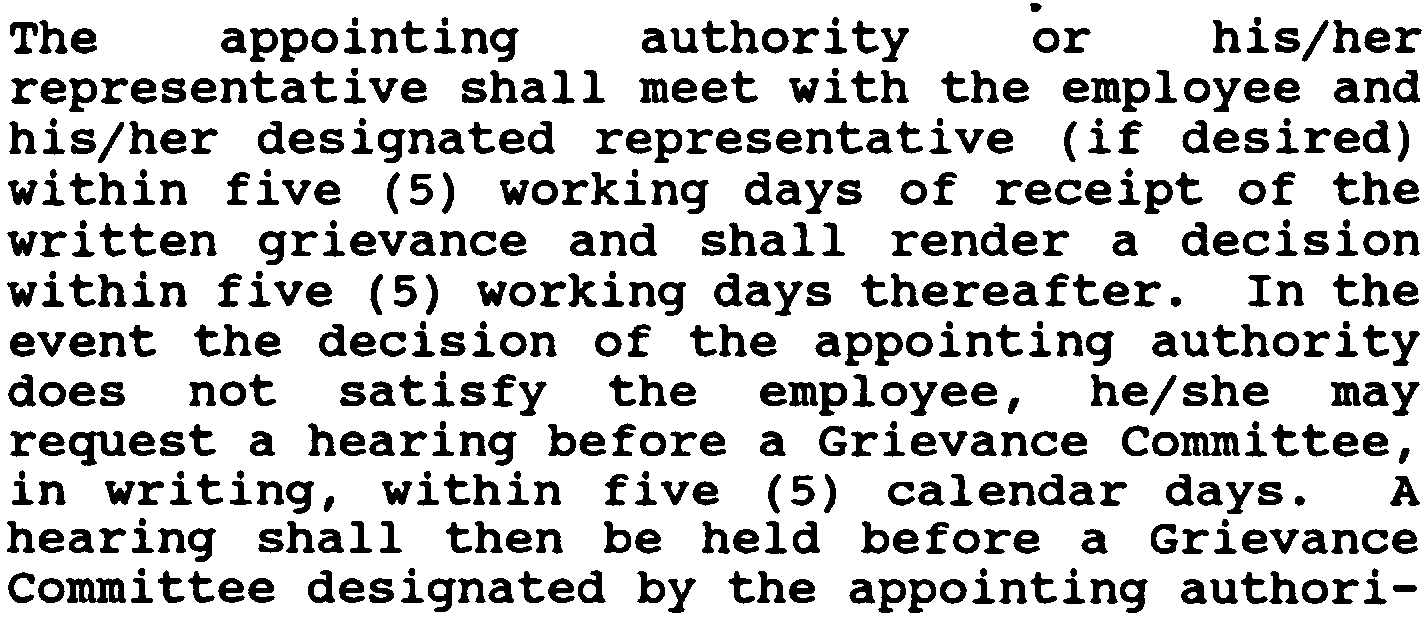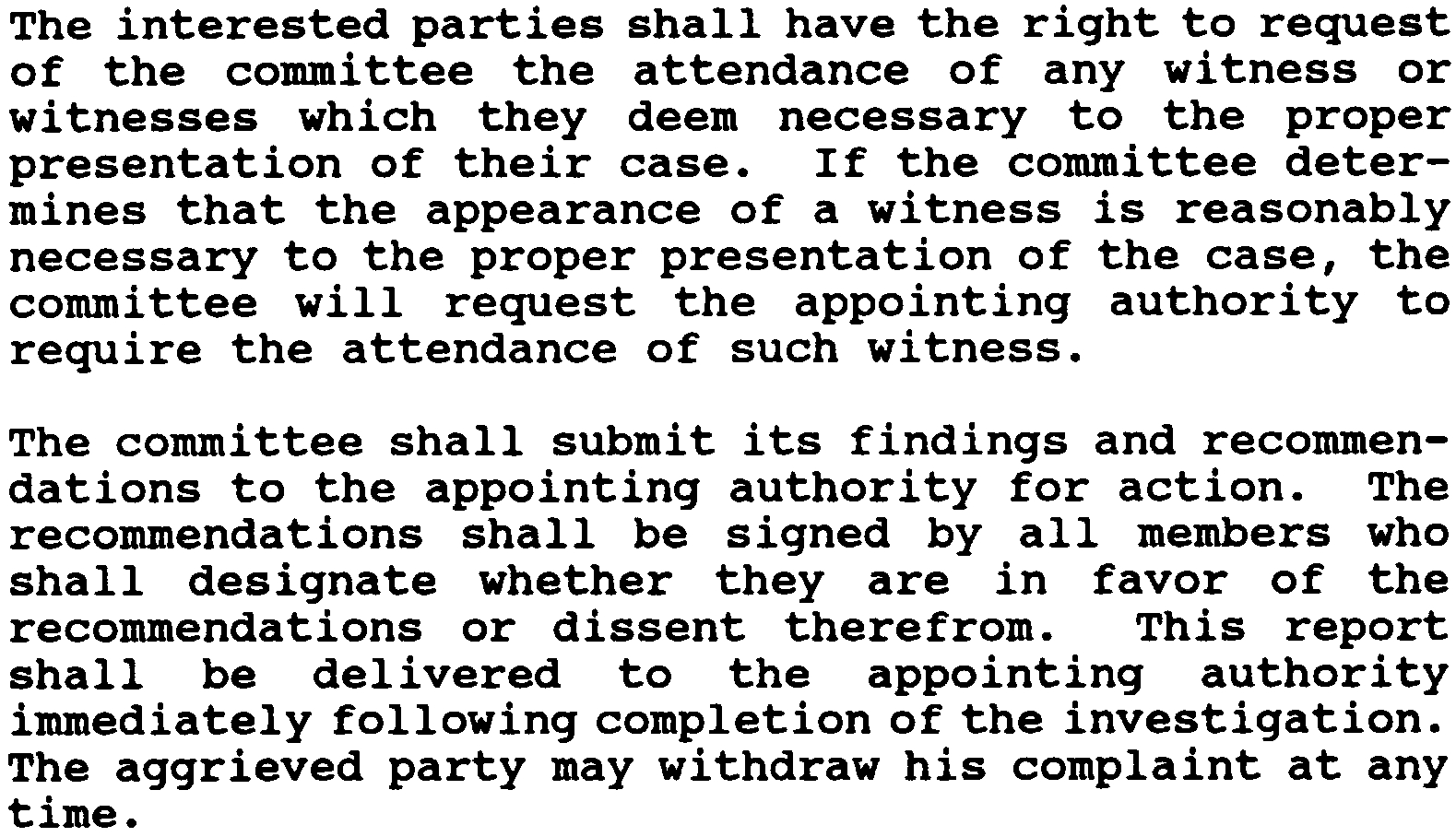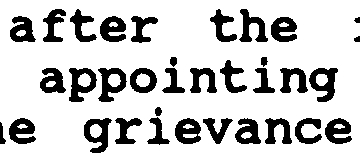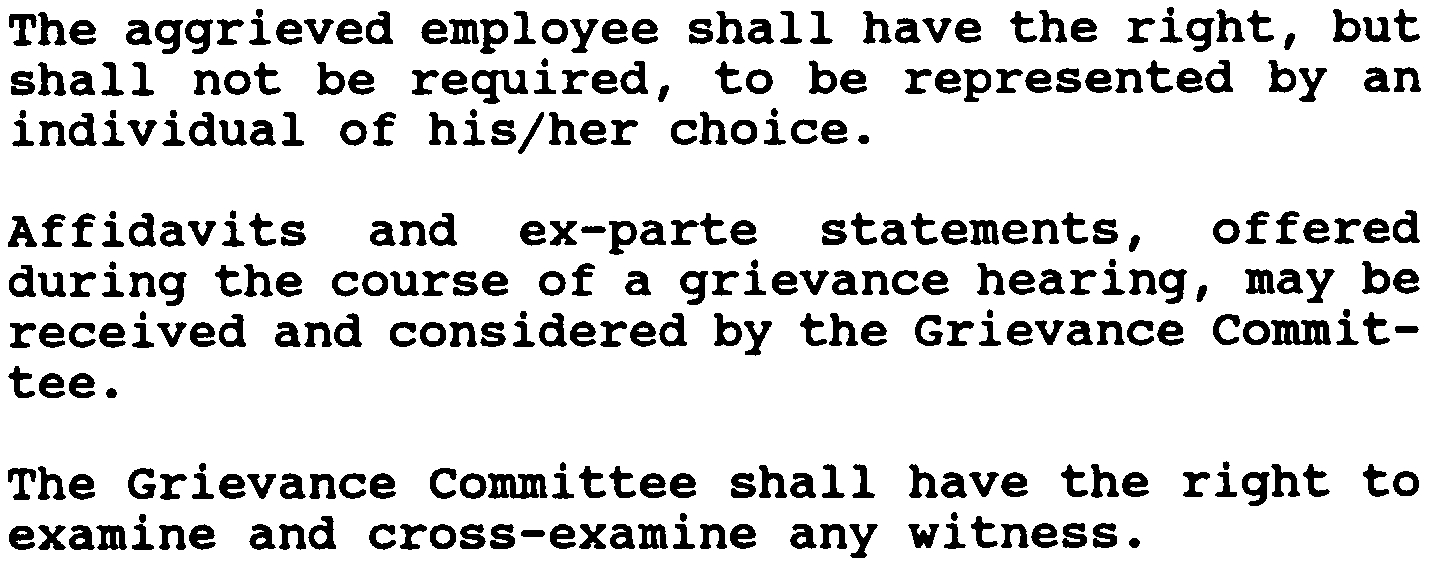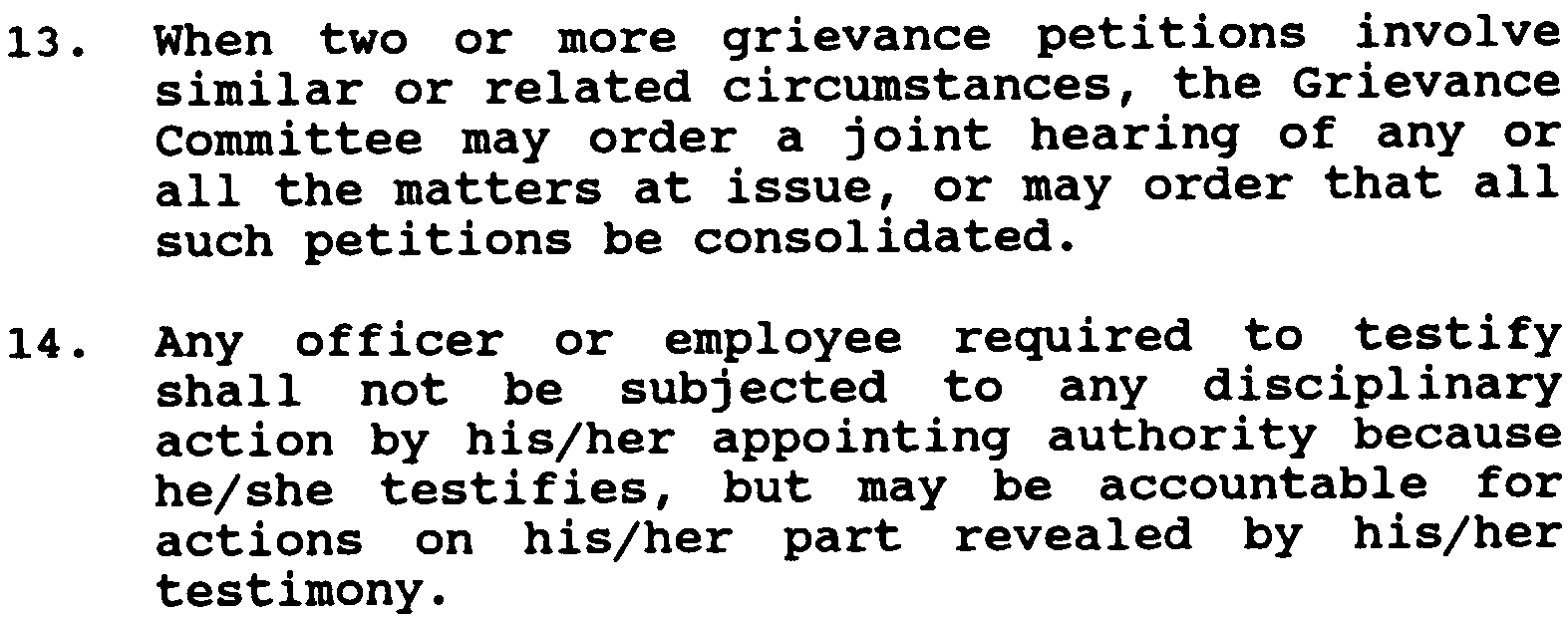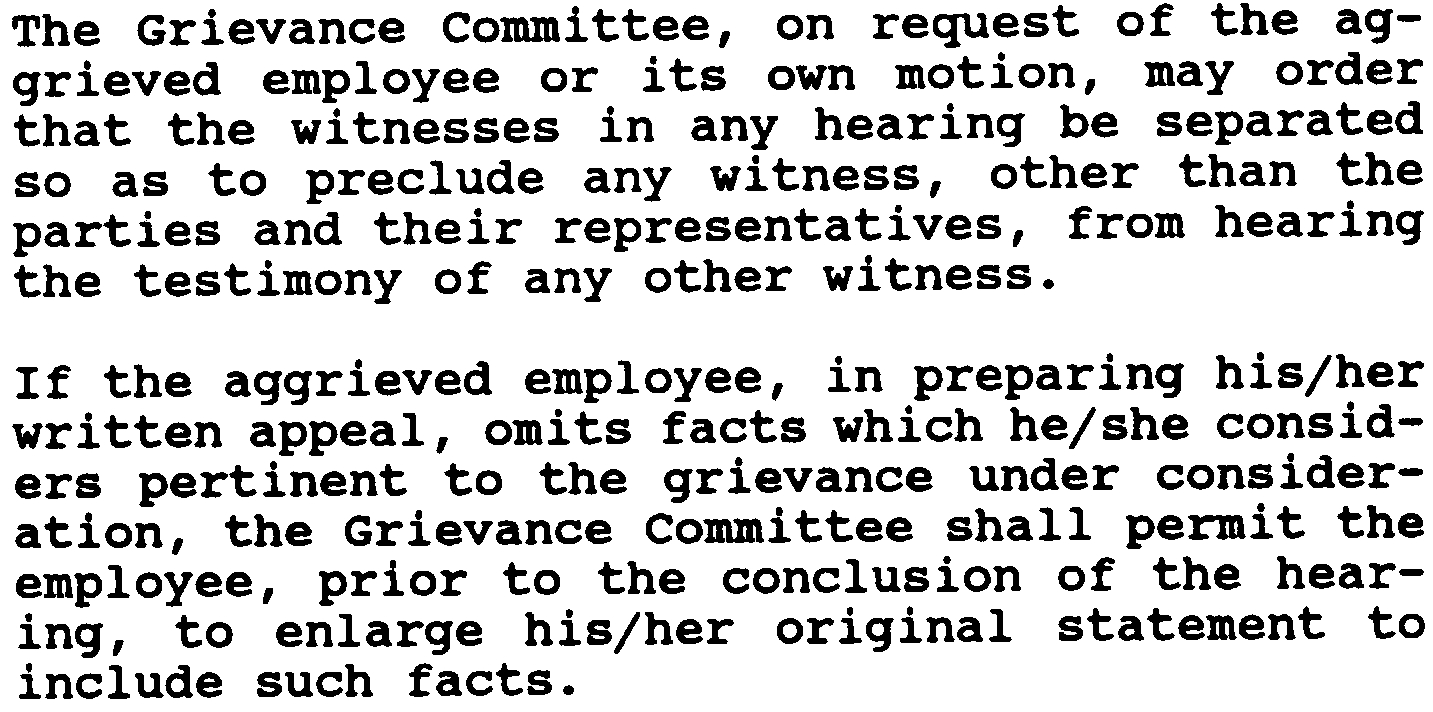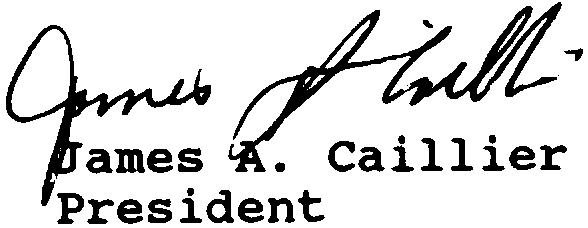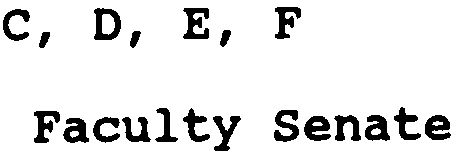MANAGEMENT INSTRUCTION
SUBJECT:
PURPOSE
To
state
Delgado's
grievance
procedures
for
classified
personnel.
SCOPE
AIm APPLICABILITY
Applies
to
all
classified
personnel.
BACKGROUND
It
is
the
policy
of
Delgado
Community
College
to
develop
and
maintain
a
satisfied
and
efficient
work
force.
Open
communication
is
encouraged
between
supervisors
and
employees
so
that
differences
can
be
resolveq
before
they
become
grievances.
It
may
be
expected,
However,
that
misunderstandings
or
dissatisfaction
will
occur
in
dayto
day
relationships
between
employees
or
between
an
employee
and his/her
supervisor.
Consequently,
grievance
procedures
have
been
instituted
for
classified
and
unclassified
employees
to
ensure
all
grievances
are
considered
in
an
orderly
and
timely
manner.
It
is
incumbent
upon
every
supervisor
to
provide
his/her
employees
an
opportunity
to
be
heard
in
accordance
with
the.procedures
contained
in
this
instruction.
POLICY
AND PROCEDURES
A.
General
provisions
1.
GRIEVANCE
POLICY
AND PROCEDURES
FOR EMPLOYEES IN
THE
CLASSIFIED
SERVICE
Nothing
herein
shall
be
so
construed
as
to
deprive
a
classified
employee
of
the
right
of
appeal
to
the
Director
of
civil
service
or
the
civil
service
Commission
i~
appropriate
cases,
or
to
alter
or
extend
the
time
within
which
an
appeal
is
required
to
be
filed
with
the
Civil
Service
commission,
or
to
alter
in
any
way
the
DCI2534.3
2.
3.
4.
5.
6.
7.
July
8,
1991
Rules
of
the
Commission.
The
appointing
authority's
decision
shall
be
final
in
all
cases
properly
subject
to
processing
through
this
grievance
procedure.
Any
employee
who
takes
reprisal
action
of
any
kind
against
any
employee
making
use
of
this
grievance
procedure
shall
be
subject
to
disciplinary
action.
If
a
grievance
hearing
is
conducted
under
this
procedure,
the
employee
against
whom
the
grievance
complaint
is
made
shall
have
the
right
to
appear
and
testify
at
the
hearing.
Any
employee
involved
in
a
grievance
complaint
is
entitled
to
be
assisted
and
represented
in
the
preparation
and
presentation
of
his
complaint
by
any
employee
of
his
own
choosing.
The
appointing
authority
of
the
College
is
entitled
to
be
assisted
or
represented
by
an
individual
of
his
own
choosing.
A
classified
employee
selected
by
a
grievant
to
represent
him
in
processing
a
grievance
shall
be
granted
necessary
time
off
to
investigate
the
grievance
and
represent
the
grievant
without
loss
of
pay
and
without
charge
to
annual
leave,
such
time
off
subject
to
the
approval
of
his
supervisor.
A
Grievance
Committee
composed
of
five
(5)
members
will
be
appointed
by
the
appointing
authority
for
purposes
of
conducting
hearings
as
provided
for
in
the
Grievance
Procedure.
An
employee
designated
as
a
member
of
the
Grievance
Committee
shall,
with
the
approval
of
the
appointing
authority,
be
granted
necessary
time
off
during
working
hours
to
prepare
for
and
hear
appeals
and
prepare
recommendations,
without
loss
of
pay
and
without
charge
to
annual
or
compensatory
leave.
The
Chairman
of
the
Grievance
Committee
shall
be
designated
by
election
from
within
its
member
ship.
Any
member
of
the
Grievance
Committee
who
is
a
party
to
or
a
party
of
the
act
resulting
in
the
grievance
in
question
shall
be
excused
from
the
July
8,
1991
8.
Definition
of
Grievance
Grievance
means
an
employee
complaint
or
personnel
problem
not
appealable
to
the
Director
of
civil
Service
or
to
the
civil
Service
commission.
As
a
general
guide,
although
not
allinclusive,
the
following
actions
would
normally
be
appealable
to
the
Director
of
civil
Service:
1.
2.
3.
4.
5.
Grievance
Procedures
1.
First
step
DCI2534.3
concerning
said
alternate
shall
be
authority.
during
any
hearing
In
such
cases,
an
by
the
appointing
Committee
grievance.
designated
Grievance
decision
Procedure
of
the
to
utilize
this
the
voluntary
employee.
The
decision
shall
be
individual
Removal
of
a
permanent
employee
for
cause.
Demotion
of
a
permanent
employee
as
a
disciplinary
action.
Political,
religious,
or
racial
discrimination.
Suspension
without
pay
as
a
disciplinary
action.
Discrimination
practiced
by
the
violation
of
the
civil
Service
Law
or
a
Civil
service
Rule.
All
grievances
should
be
presented
within
ten
(10)
calendar
days
from
the
date
the
grievant
first
became
aware
of,
or
should
have
become
aware
of,
the
cause
of
such
grievance.
The
aggrieved
employee
should
present
his/her
grievance
to
his/her
immediate
supervisor,
and
if
possible,
it
should
be
settled
at
that
level
through
discussion.
The
immediate
supervisor
should
render
a
decision
to
the
employee
on
the
complaint
as
soon
as
possible,
and
must
render
an
oral
decision
within
three
(3)
calendar
days.
Since
the
grievance
is
being
processed
informally
at
this
stage,
neither
the
supervisor
nor
the
employee
shall
have
representation.
3
DCI2534.3
July
8,
1991
second
step
If
the
grievance
has
not
been
settled,
it
shall
be
presented
in
writing
by
the
employee
to
the
department
head
within
seven
(7)
working
days
after
the
supervisor's
response
is
due.
The
department
head
shall
respond
to
the
employee
in
writing
within
five
(5)
working
days.
Third
step
If
the
grievant
is
not
satisfied
with
the
decision
of
the
department
head,
he/she
shall
within
five
(5)
working
days,
beginning
with
the
first
working
day
after
receiving
the
decision,
submit
the
written
and
signed
grievance
to
the
department
head's
supervisor.
The
department
head's
immediate
supervisor
shall
respond
within
three
(3)
working
days
of
receipt
of
grievance
and
forward
to
his
immediate
supervisor
until
it
reaches
the
vice
president
level.
The
vice
president
shall
respond
to
the
grievant
within
three
(3)
working
days
of
receipt.
If
the
grievance
is
settled
to
the
satisfaction
of
the
grievant
prior
to
reaching
the
fourth
step,
a
copy
should
be
sent
to
the
appointing
authority.
Fourth
step
If
the
employee
is
not
satisfied
with
the
decision
in
step
Three,
he/she
shall,
within
five
(5)
working
days,
beginning
with
the
first
working
day
after
receiving
the
decision,
submit
his/her
written
and
signed
grievance
to
the
appointing
authority
of
the
College.
The
appointing
authority
~r
his/her
representative
shall
meet
with
the
employee
and
his/her
designated
representative
(if
desired)
within
five
(5)
working
days
of
receipt
of
the
written
grievance
and
shall
render
a
decision
within
five
(5)
working
days
thereafter.
In
the
event
the
decision
of
the
appointing
authority
does
not
satisfy
the
employee,
he/she
may
request
a
hearing
before
a
Grievance
Committee,
in
writing,
within
five
(5)
calendar
days.
A
hearing
shall
then
be
held
before
a
Grievance
Committee
designated
by
the
appointing
authori
4
July
8,
1991
Action
bv
Grievance
committee
Upon
receipt
of
a
grievance
complaint,
the
Chairman
shall,
at
the
earliest
practical
time,
but
no
later
than
five
(5)
days,
call
a meeting
of
the
committee
to
consider
the
grievance.
The committee
shall
then
make
whatever
investigation
is
necessary.
If
it
finds
sufficient
justification,
the
aggrieved
party
shall
be
instructed
to
furnish
names
of
witnesses.
The
committee
may
conduct
private
sessions.
The
interested
parties
shall
have
the
right
to
request
of
the
committee
the
attendance
of
any
witness
or
witnesses
which
they
deem
necessary
to
the
proper
presentation
of
their
case.
If
the
committee
deter
mines
that
the
appearance
of
a
witness
is
reasonably
necessary
to
the
proper
presentation
of
the
case,
the
committee
will
request
the
appointing
authority
to
require
the
attendance
of
such
witness.
The
committee
shall
submit
its
findings
and
recommen
dations
to
the
appointing
authority
for
action.
The
recommendations
shall
be
signed
by
all
members
who
shall
designate
whether
they
are
in
favor
of
the
recommendations
or
dissent
therefrom.
This
report
shall
be
delivered
to
the
appointing
authority
immediately
following
completion
of
the
investigation.
The
aggrieved
party
may
withdraw
his
complaint
at
any
time.
Summaa
Disgosition
of
Grievance
At
any
writing,
dispose
grounds.
1.
DC!
2534.3
ty.
within
five
(5)
days
after
receipt
of
the
recommendations,
the
appointing
authority
will
meet
the
Chairman
of
the
Committee,
the
aggrieved,
and
the
other
party
involved
to
render
his
final
decision.
The
employee
may
request
the
attendance
of
a
representative.
A
written
decision
notifying
all
interested
parties,
including
the
Director
of
civil
service,
will
be
sent
within
five
(5)
days.
after
the
appointing
grievance
filing
of
a
grievance
in
authority
may
summarily
on
any
of
the
following
time
the
of
the
That
the
appointing
rity
lacks
jurisdiction
autho
5
DCI2534.3
2.
3.
4.
5.
6.
7.
When
an
appointing
authority
summarily
disposes
of
a
written
grievance,
he/she
shall
notify
all
interested
parties,
including
the
Director
of
civil
Service,
in
writing.
Notice
of
Hearing
The
aggrieved
employee
shall
be
given
notice
at
least
five
(5)
calendar
days
in
advance
of
the
hearing,
provided
that
by
consent
of
the
Grievance
Committee
and
the
aggrieved
employee,
such
notice
and
delay
may
be
waived.
Time
and
Place
of
Bearing:
The
place
of
the
grievance
hearing
shall
be
specified
by
the
appointing
authority
and
shall
be
in
a
conve
nient
place
accessible
to
the
aggrieved
employee.
All
such
hearings
shall
be
held
on
the
employer's
premis
es,
or
on
other
premises
mutually
agreeable
to
the
parties
and
within
regular
working
hours;
provided,
that
with
the
approval
of
the
appropriate
appointing
authority,
any
such
hearing
may
continue
beyond
normal
working
hours.
July
8,
1991
or
of
the
person
against
of
the
subject
matter,
whom
relief
is
sought.
That
only
the
civil
service
commission
has
jurisdiction
as
stated
in
Part
4.1
and
4.2
of
the
civil
Service
manual.
That
the
aggrieved
has
no
legal
right
to
griev
ance
consideration.
That
the
grievance
has
not
been
made
in
the
re
quired
manner
or
within
the
prescribed
period
of
delay.
That
a
decision
on
the
grievance
would
be
inef
fective.
That
the
aggrieved
has
failed
to
appear
at
the
time
and
place
fixed
for
the
hearing
of
his/her
grievance.
That
the
aggrieved
has
withdrawn
or
abandoned
his/her
request
for
grievance
consideration.
6
July
8,
1991
Conduct
of
Bearina
1.
The
aqqrieved
employee
and
the
employinq
aqency
shall
have
the
riqht
to
call,
examine,
and
crossexamine
witnesses
who
are
employees
of
the
aqency
aqainst
which
the
qrievance
is
lodqed
and
who
have
knowledqe
of
the
facts
at
issue.
B.
2.
3.
4.
5.
6.
7.
8.
9.
When a pending
case
involves
substantially
the
same question
of
law
or
fact
as
presented
in
a
prior
case,
the
Grievance
Committee
may consider
any
part
of
the
record
in
such
previous
case
as
it
may
deem
relevant;
provided,
that
in
the
application
of
this
provision,
no party
shall
be
deprived
of
the
right
to
crossexamine
any
witness.
DC!
2534.3
Both
parties
may
produce
witnesses
other
than
employees
of
the
agency
against
which
the
griev
ance
is
lodged,
and
such
witnesses
shall
be
subject
to
examination
and
crossexamination.
called
by
the
witnesses
be
paid
Necessary
travel
under
section
H.1
College.
of
shall
expenses
above
The
aggrieved
require
the
cords,
and
the
right
to
papers,
re
within
the
employee
production
other
items
shall
have
of
books,
which
are
control
of
the
agency
against
which
the
griev
ance
is
lodged;
which
are
pertinent
at
issue;
and
which
are
not
held
to
tial
by
provision
of
state
statute,
or
Constitutional
law.
to
the
facts
be
confiden
public
law,
The
aggrieved
employee
shall
have
the
right,
but
shall
not
be
required,
to
be
represented
by
an
individual
of
his/her
choice.
Affidavits
and
exparte
statements,
offered
during
the
course
of
a
grievance
hearing,
may
be
received
and
considered
by
the
Grievance
Commit
tee.
The
Grievance
Committee
shall
have
the
right
to
examine
and
crossexamine
any
witness.
to
The
Grievance
Committee
shall
have
the
right
limit
corroborative
evidence.
7
DCI2534.3
10.
The
testimony
of
all
witnesses
may
be
received
under
oath.
11.
12.
13.
When
two
or
more
grievance
petitions
involve
similar
or
related
circumstances,
the
Grievance
Committee
may
order
a
joint
hearing
of
any
or
all
the
matters
at
issue,
or
may
order
that
all
such
petitions
be
consolidated.
14.
Any
officer
or
employee
required
to
testify
shall
not
be
subjected
to
any
disciplinary
action
by
his/her
appointing
authority
because
he/she
testifies,
but
may
be
accountable
for
actions
on
his/her
part
revealed
by
his/her
testimony.
CANCELLATION
5.
This
instruction
cancels
Part
II,
section
2
1113)
of
the
Delgado
Personnel
Distribution:
SDL
A,
B,
President,
cc:
July
8,
1991
The
Grievance
Committee,
on
request
of
the
ag
grieved
employee
or
its
own
motion,
may
order
that
the
witnesses
in
any
hearing
be
separated
so
as
to
preclude
any
witness,
other
than
the
parties
and
their
representatives,
from
hearing
the
testimony
of
any
other
witness.
If
the
aggrieved
employee,
in
preparing
his/her
written
appeal,
omits
facts
which
he/she
consid
ers
pertinent
to
the
grievance
under
consider
ation,
the
Grievance
Committee
shall
permit
the
employee,
prior
to
the
conclusion
of
the
hear
ing,
to
enlarge
his/her
original
statement
to
include
such
facts.
(pages
117
to
1
OM
2100.2.
Manua
~
~~~~~
~
President
c,
D,
E,
F
Faculty
Senate
8
Back to top
